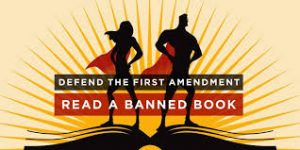After transcribing my interview with Trish and being able to read it over more easily, I am interested in exploring some of the connections between what Liz discussed and our prior readings and class discussions. Reflecting on the Crutcher article “How they do it,” the similarities between the rush to judgement at the school that pulled his book and the reaction in Webster are apparent. Webster had a comprehensive plan for dealing with the selection and challenges of library material, 5292, that states “Access to a challenged material shall not be restricted during the reconsideration process.” This policy was ignored in the name of quickly pleasing a complaining parent, shedding light on the pressures administrators face and the sad reality that, sometimes, the threat to an administrator’s job comes from annoying a few vocal adults, not depriving hundreds of children the opportunity to build and expand their understanding. Looking back on Downs’ article on government censorship, the landscape of censorship has changed dramatically since 1945, with local opinion often lagging behind supreme court opinions, and the generation in which book challengers grew up reasonably playing an impact in their view of controversial material. As Trish Warren noted, “nowadays I think kids are exposed to far more than they were perhaps when the fathers of these kids, the challengers, were growing up, and I think that’s hard sometimes for people to accept.” Indeed, the challengers were appalled by certain passages in Rainbow Boys but were unable to look beyond what they might consider a singular instance of “smut” to see the value of the material holistically. As we’ve noted in class, a single instance of inappropriate content may sometimes be irritating enough to warrant challenge, or merely serve as a gateway to banning the larger themes of a book. Though the motives of the Webster challengers are impossible to know for sure without talking to them, some combination of the two seems most likely. Even broader, one thing readings and discussions have clearly revealed is censorship is not as black and white as we are led to believe. Trish Warren notes of Perks of Being a Wallflower that she urged the public library to carry it but the amount of controversial material did not warrant a valuable enough “so what?” in her judgement. Though it is easier for the ALA to simply say “Read a banned book this week,” student age and the quality of the book, to name a few factors, clearly create the need for a case by case judgement if we’re serious about creating the best conditions for our students.

Looking forward, Liz and I need to take a cue from Sophia and Karina and enhance our aesthetics. Considering color schemes of all the smaller aspects of our site that writing focused analyzers like Liz and I could be prone to ignore. On Wednesday, with our newfound free time, LIz and I plan to give the website some of the attention it has been lacking, though I am confident that all of the components, context, and analysis we have been working to complete will drive our website to be effective and engaging.
